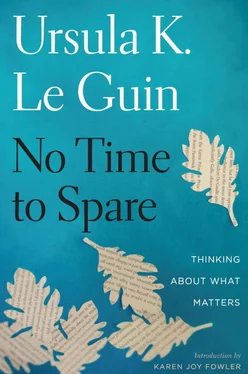This whole change in style of uniforms may be part of a change in our style of war, and with it a changed attitude toward service in the military. Possibly it reflects a newly realistic opinion of war, a refusal to glamorize it. If we cease to see war as an inherently noble and ennobling thing, we cease to put the warrior on a pedestal. Handsome uniforms then seem a mere parade, a false front for the senseless brutality of behavior in war. So “fatigues” can be grossly utilitarian, with no thought for the appearance or self-esteem of the wearer. Anyhow, now that most war is waged not between armies but by machines killing civilians, what’s the meaning of a military uniform at all? Didn’t the child dead in the ruins of a bombed village die for her country just as any soldier does?
But I can’t believe the army thinks that way, that it’s making uniforms ugly in order to encourage us to think war is ugly. Perhaps the fatigue uniform reflects an attitude they aren’t conscious of and would never admit, a change less in the nature of war than in our national attitude to it, which is neither glamorizing nor realistic but simply uncaring. We pay very little attention to our wars or to the people fighting them.
Right or wrong, in the 1940s we honored our servicemen. We were in that war with them. Most of them were draftees, some quite unwilling ones, but they were our soldiers and we were proud of them. Right or wrong, since the 1950s and particularly since the 1970s, we began putting whichever war was on at the moment out of sight and out of mind, and with it the men and women fighting it. These days they’re all volunteers. Yet—or therefore?—we disown them. We give them pro forma praise as our brave defenders, send them over to whichever country we’re fighting in now, keep sending them back over, and don’t think about them. They aren’t us. They aren’t people we really want to see. Like the people in jails, the people in loony bins. Like clowns that aren’t funny, from a third-rate circus we wouldn’t think of going to.
Now shall we talk about how much we pay, how we are bankrupting our future, to keep that circus going?
No. That’s not something we talk about. Not in Congress. Not in the White House. Not anywhere.
Clinging Desperately to a Metaphor
September 2011
Unless the people benefit, economic growth is a subsidy for the rich.
—Richard Falk, “Post-Mubarak Revolutionary Chances,”
Al Jazeera, 22 February 2011
IT’S AS SILLY for me to write about economics as it would be for most economists to write about the use of enjambment in iambic pentameter. But they don’t live in a library, and I do live in an economy. Their life can be perfectly poetry-free if they like, but my life is controlled by their stuff whether I like it or not.
So: I want to ask how economists can continue to speak of growth as a positive economic goal.
I understand why we’re in a panic when our business or our whole economy goes into a decline or a recession: because the whole system is based on keeping up with/outgrowing the competition, and if we fail to do that, we face hard times, collapse, crash.
But why do we never question the system itself, so as to find ways to get around it or out of it?
Up to a point, growth is a plausible metaphor. Living things need to grow, first to their optimum size, and then to keep replacing what wears out, annually (as with many plants) or continually (as with mammalian skin). A baby grows to adult size, after which growth goes to maintaining stability, homeostasis, balance. Growth much beyond that leads to obesity. For a baby to grow endlessly bigger would be first monstrous, then fatal.
In taking uncontrolled, unlimited, unceasing growth as the only recipe for economic health, we’ve dismissed the ideas of optimum size and keeping the organism in balance.
Maybe there are organisms that have no optimum size, like the enormous fungal network one hears about that underlies the whole Middle West, or is it just Wisconsin? But I wonder if a fungus wandering around thousands of square miles underground is the most promising model for a human economy.
Some economists prefer to use mechanical terms, but I believe machines have an optimum size much as living organisms do. A big machine can do more work than a small one, up to a point, beyond which things like weight and friction begin to ruin its efficiency. The metaphor comes up against the same limit.
Then there’s social Darwinism—bankers red in tooth and claw, surviving fitly, while small vermin live on the blood that trickles down… This metaphor, based on a vast misunderstanding of evolutionary process, hits its limit almost at once. In predatory competition, bigness is useful, but there are endless ways to get your dinner besides being bigger than it is. You can be smaller but smarter, smaller but faster, tiny but poisonous, winged… you can live inside it while you eat it… As for getting a mate, if combat were the only way to score, large size would help, but (despite our battle fixation) most competition doesn’t involve combat. You can win the reproductive race by dancing gracefully, by having a blue-green tail decorated with eyes, by building a lovely bower for your bride, by knowing how to tell a joke… As for living space, you can crowd out your neighbors by outgrowing them, but it’s cheaper and just as effective to corner all the water in the vicinity, like a juniper tree, or to be toxic to sea anemones who aren’t closely related to you… The competitive techniques of plants and animals are endless in variety and ingenuity. So why are we, clever we, stuck on one and one only?
An organism that settles on a single survival stratagem and ceases to seek and find others—ceases to adapt—is at high risk. And adaptability is our principle and most reliable gift. As a species we are almost endlessly, almost appallingly adaptable. Capitalism thinks it’s adaptable, but if it only has one stratagem, endless growth, the limit of its adaptability is irrevocably set. And we have reached that limit. We are therefore at very high risk.
Capitalist growth, probably for at least a century and certainly from the turn of the millennium on, has been growth in the wrong sense. Not only endless but uncontrolled—random. Growth as in tumor. Growth as in cancer.
Our economy isn’t just in a recession. It is sick. As a result of uncontrolled economic (and population) growth, our ecology is sick, and getting sicker every day. We have disturbed the homeostasis of the earth, the ocean, and the atmosphere—not fatally to life on the planet; the bacteria will survive the corporation. But perhaps fatally to ourselves.
We have been in denial about this for decades. By now the denials are hysterical in every sense of the word— What do you mean, climate instability? What do you mean, overpopulation? What do you mean, reactors are toxic? What do you mean, you can’t live on corn syrup?
We go on mechanically repeating the behaviors that caused the sickness: we bail out the bankers, we resume offshore drilling, we pay polluters to pollute, because without them how is our economy to grow? Yet increasingly, all economic growth benefits only the rich, while most people grow poorer. The Economic Policy Institute reports:
From 2000 to 2007 (the last period of economic growth before the current recession) the richest 10% of Americans received 100% (one hundred percent—all) the average growth of income. The other 90% received none.
At this rate, by the time we admit that cancer is not health, that we’re sick, any cure must be so radical as almost certainly to require dictatorial rule, and to destroy more—physically and morally—than it can save.
Nobody in any government seems able even to imagine alternatives, and people who talk about them get little attention. Some of the alternatives that existed in the past had promise; I think socialism did, and still does, but it was run off the rails by ambitious men using it as a means to power, and by the infection of capitalism—the obsession with growing bigger at all cost in order to defeat rivals and dominate the world. The example of the larger socialist states is about as heartening as that of the giant underground fungus.
Читать дальше












